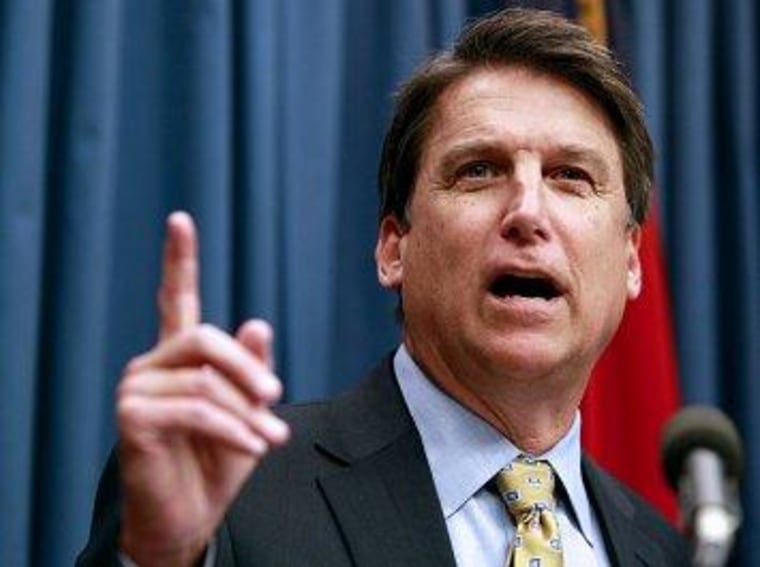Two weeks ago, North Carolina Gov. Pat McCrory (R) touted the state's sweeping new voting restrictions, though he clearly struggled with the basics. The Republican governor boasted, for example, that the law allows online voter registration, which turned out to be wrong. When McCrory said new measures are intended to prevent fraud, a reporter asked what eliminating pre-registration for North Carolinians under 18 has to do with preventing fraud.
"I don't know enough, I'm sorry, I haven't seen that part of the bill," he replied.
This week, McCrory signed the most severe voter-suppression bill in the nation into law -- dismissing "scare tactics" from the "extreme left" -- but he's still confused about what it does.
Leaving politics aside, McCrory repeated one incorrect turn of phrase at least three times, speaking on WUNC's The State of Things, NPR's Here and Now, and in an interview with WWNC.In all three interviews, he was asked or talked about the changes to early voting. The law reduces the early voting period from 17 days to 10 days starting in 2014. While talking about these changes, McCrory seemed to say the system would be more fair because each early voting location within a county would have to open for the same days and hours. But he added this:"We have every political precinct open the week before election," McCrory told WUNC's Frank Stasio. On "Here and Now," McCrory said, "We have two weeks of early voting and we changed some of the rules where every precinct has to be open, where politics are not being played out by either political party on having certain precincts open in certain areas to deny people the proper access."
First, 10 days of early voting isn't the same as "two weeks of early voting." The difference may not sound like much, but when McCrory and North Carolina Republicans cut the early-voting window by 41%, for no reason other than to punish voters they don't like, those lost days matter.
Second, when McCrory says "every" precinct will be open for early voting, he's wrong.
WRAL explained:
Precincts are small units of geography that make up the districts from which city council members, county commissioners, lawmakers and the like are elected. On Election Day, voters go to the polling location for their individual precinct to vote. In Wake County, for example, there are 198 precincts, each of which has a different polling site on Election Day.By contrast, Wake County has about 15 early voting locations in presidential election years.So to say that all precincts will be open during the early voting period is both wrong and suggests a level of access that won't really be available to voters.
The governor repeated this claim three times during yesterday's interview.
Look, I don't mean to sound picky, but if a governor is going to impose sweeping new voting restrictions without a good reason, he should at least try to understand what he's done. McCrory has now repeated false claims about this ugly new law several times.
If the governor is making untrue claims in the hopes of making his offensive restrictions look more appealing to North Carolinians, it's not working -- Public Policy Polling released a statewide survey this week that found 39% of N.C. voters support the new voting law, while 50% oppose it.
In the meantime, Sen. Kay Hagan (D), who's up for re-election next year, sent a request to the Justice Department yesterday, asking the attorney general to review the new law's legality. "Protecting the fundamental right of our citizens to vote should be among the federal government's highest priorities. In response to voting restrictions signed into law yesterday, I strongly encourage the Justice Department to immediately review North Carolina House Bill 589 and take all appropriate steps to protect federal civil rights and the fundamental right to vote," Hagan wrote.
While the DOJ takes a look, two other lawsuits challenging the new law have already been filed.
